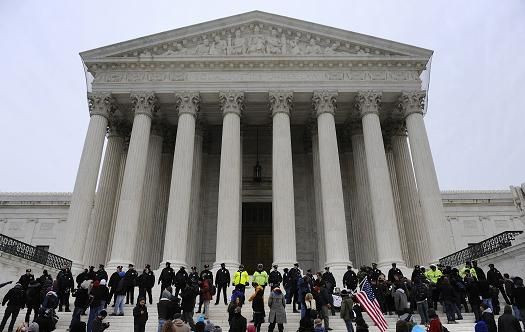US Supreme Court Rules On Gene Patenting, Invalidates Myriad BRCA Patents

The Supreme Court ruled unanimously Thursday that genes occurring naturally in the body cannot be patented.
The unanimous ruling by the high court found that Myriad Genetics Inc.’s patent claims for the isolated human genes BRCA1 and BRCA2 -- which, when mutated, can lead to breast and ovarian cancer -- were products of nature and therefore unpatentable. But the court also ruled that complementary DNA sequences, or cDNA, consisting of just the coding portions of a gene, are patentable. Some of Myriad’s claims to cDNA versions of the BRCA genes might survive after the ruling.
But it was Myriad's patent claims on isolated, or genomic, versions of human genes that especially galled plaintiff AMP, a scientific organization. Those portions of the patent allowed Myriad to claim the exclusive right to isolate a person's BRCA1 and BRCA2 genes, which effectively gave the company a monopoly on BRCA breast cancer risk screening.
Myriad “found an important and useful gene, but groundbreaking, innovative, or even brilliant discovery does not by itself satisfy” the legal requirements to claim invention status, Justice Clarence Thomas wrote for the U.S. Supreme Court.
University of California, Irvine law professor Dan Burk noted that the court was keeping its ruling quite narrow. The opinion also drops some hints to researchers on how they might draft valid patent claims on DNA in the future.
“It says, for example, that the Myriad patent might be valid if it claimed the DNA in terms of chemical structure rather than in terms of the genetic sequence,” Burk wrote in an email. “It also explicitly excludes processes and applications of the DNA from the ruling. So going forward, patent drafters will presumably try writing new DNA patents in those terms that the Court has said may be acceptable.”
The ruling is in part a victory for a group of scientists and patients' rights advocates that argued Myriad’s patents chilled scientific research and hampered access to affordable genetic risk screening. Isolating DNA is an essential step in genetic testing, while scientists do not necessarily need the cDNA sequence of a gene for testing purposes.
"Today, the court struck down a major barrier to patient care and medical innovation," Sandra Park, an American Civil Liberties Union senior staff attorney, said in a statement. "Myriad did not invent the BRCA genes and should not control them. Because of this ruling, patients will have greater access to genetic testing and scientists can engage in research on these genes without fear of being sued."
In his opinion for the court, Justice Thomas pointed to a 1980 Supreme Court case, Diamond v. Chakrabarty, which found that genetically modified organisms can be patented. That case centered on a manipulated bacterium, into which a General Electric engineer had inserted genes that enabled the microorganism to break down crude oil.
“By contrast, Myriad did not create anything… separating [a] gene from its surrounding genetic material is not an act of invention,” Justice Thomas wrote.
© Copyright IBTimes 2025. All rights reserved.





















